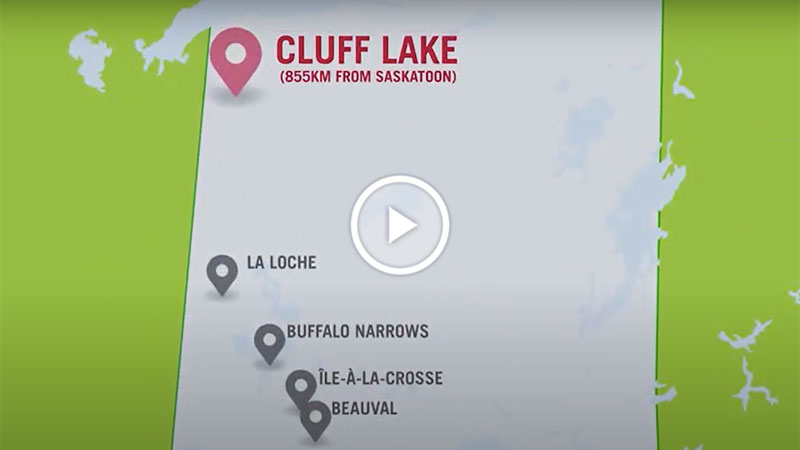Decommissioning

Returning the land to its natural state
Designed to be Decommissioned
We take environmental health seriously – so we design our facilities with their eventual decommissioning in mind.
Orano Canada’s Cluff Lake mine is the first uranium site of its era to be decommissioned under modern standards. Continuously monitored and inspected annually, the area shows strong environmental performance, and is a prime example of responsible resource development. The site has unrestricted access for traditional purposes such as fishing, hunting, and trapping.
The Cluff Lake Story
Located in the western Athabasca Basin, in northern Saskatchewan, the Cluff Lake mine operated between 1980 and 2002, producing over 62 million pounds of yellowcake.
Most of the physical decommissioning was completed by 2006, and in 2013, access to the site became unrestricted as Orano’s full-time occupation ended (though environmental monitoring and regulatory inspections trips are still conducted). Risk assessments predict long-term stability and safety, and the site is doing well: over 650,000 trees have been planted, flourishing alongside returning grasses and blending the area back into nature.
The Canadian Nuclear Safety Commission (CNSC) renewed Cluff Lake's decommissioning licence for five years, effective to July 31, 2024 – with the final goal being a transfer of the site back to the province under the Institutional Control Program (ICP). The Institutional Control Program is designed to protect the public from the costs associated with closed mines. Under this program Orano is responsible for providing funding for the continued monitoring, potential maintenance and unforeseen events at the site in the future. After considering the submissions at a public hearing on March 1, 2023, the CNSC approved Orano's application to revoke the Cluff Lake Project's mine and mill operating licence and allow for the site to be transferred to the Province of Saskatchewan.
Cluff Lake
Orano Canada: 100%
Operator: Orano Canada
Is the water quality downstream of Cluff Lake meeting the objectives of the decommissioning plan?
Yes, water quality across the site and downstream meets decommissioning objectives and is expected to continue to do so in the long-term.
Is it safe to eat traditional foods from the Cluff Lake area?
Yes, environmental risk assessment has shown that it is safe for a casual visitor to hunt, fish, gather plants and berries, and trap around the Cluff Lake site.
Are the pits, waste rock piles, and tailings management area safe and stable in the long-term?
Yes, routine inspections have shown that the areas are performing well with good growth of trees and grasses.
- Northern scholarships Orano provides scholarships for post-secondary students from northern Saskatchewan each year. We have been contributing to the education of northern students for more than 40 years. The current Application Form and Information is available here.
- Community investment Orano’s community investment pillar is primarily focused on community initiatives and organizations in the regions near our operations and activities or where our employees reside.
- Incident notification This information notifies the public of incidents that may be important to them, remedial actions undertaken, and their potential effect on health, safety and the environment.

